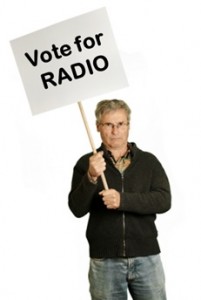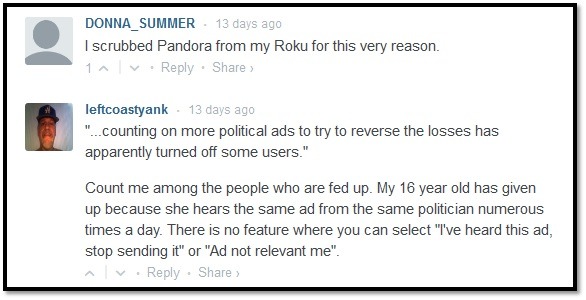Today is Election Day at long last. All those annoying political ads for governors, senators, judges, secretaries of state, and various proposals will mercifully end. On broadcast radio the early returns on political spending are mixed. So this post is being written without 100% of precincts reporting, but stories in the industry trades indicate that this was not a stellar  political cycle for broadcast radio.
political cycle for broadcast radio.
Before the polls opened this morning, some reports pointed to a slow season with unexciting races that have failed to capture the public’s interest. But television seems to be full of these nasty repetitious ads, often featuring multiple political spots in the same cluster. And Wall Street Journal reports indicate that TV was essentially sold out in many markets.
The Washington Post confirms that they’re partying at TV stations all over the country. For starters, political campaigns increased their ad spending $100 million dollars compared to the last mid-term election four years ago. And while there has been a decided move to digital advertising, writers Cecilia Kang and Matea Gold point out that TV is still king:
“But one thing remains largely unchanged: the belief that television ads are the best way to reach voters. While campaigns are increasingly embracing online advertising, they still rely heavily on the tried-and-true technique of reaching voters on the airwaves. There, they can find a guaranteed audience of the most faithful voters: older people, who are particularly valuable in low-turnout midterm elections.”
But TV’s dependability hasn’t stopped the onslaught of new media ad channels. According to CNBC, Pandora has enjoyed an unprecedented boost in political ads. Attributed to its ability to target voters based on zip code and demographic information, Pandora claims that 400 campaigns have utilized its music genome to target ads at constituents who have tuned in channels headlined by Jason Aldean, Iggy Azalea, and Stevie Ray Vaughan. That level of commitment is double Pandora’s political efforts in 2012, according to Pandora VP of sales, Sean Duggan.
Pandora attacked this mid-term political season with a strategy, focusing on its targetable metrics, as well as emphasizing their own research that consumers who enjoy certain genres of music lean in one direction or another politically. And Pandora’s major presence on mobile devices is yet another tool in the arsenal for politicians, consultants, operatives, and interest groups trying to further their agenda.
Regular readers of this blog may remember we’ve referred to a session at last December’s Nielsen Client Conference/Jacobs Media Summit that featured political consultants Mark Mellman and David Winston. These guys agree on very little as they reside on very different sides of the aisle. Both were interviewed on stage by Edison’s Larry Rosin and Joe Lenski, and one thing they did agree on is that radio has not made its case for viability in political campaigns.
At the time, we expressed concerns that for yet another political cycle, radio was unprepared to benefit from its historical value, its local roots, its demographic targeting, and its ability to reach more U.S. citizens than Pandora or Spotify.
But as both Mellman and Winston pointed out, radio’s proof of performance is suspect. Both complained about a lack of accountability and radio inability to hyper-target zip codes, making it less efficient for local races.
Too often, radio’s political strategy seems to be along the lines of, “Let’s hope that TV sells out so they’ll be forced to run ads on our stations.” That might partially explain why political ads often come in late for radio –television runs out of inventory.
That “wait and hope” strategy may have worked in a media environment punctuated by scarcity. But today, there is no shortage of outlets, and so politicians (as well as car dealers and other advertising categories) now rally around channels that allow them to better target key groups.
Pandora continues to challenge broadcast radio – first, for share of ears and now for share of political advertising dollars. With two years to go before a possible Clinton vs. Bush Presidential race (no matter who is nominated, billions will be spent), broadcast radio has its own campaign to wage, proving its viability and efficacy in a media environment that is moving away from legacy industries and outlets.
 Maybe that’s why radio should be assessing its political competition more carefully. Why do pros like Mellman and Winston believe that radio is an unproven medium – after decades of political campaigns? And what are the lessons to be learned from accountability in media spending?
Maybe that’s why radio should be assessing its political competition more carefully. Why do pros like Mellman and Winston believe that radio is an unproven medium – after decades of political campaigns? And what are the lessons to be learned from accountability in media spending?
Today also marks the first time broadcasters in North America can sign up for Techsurvey11. And my campaign promise is that we will include a questions about stream registration for broadcast radio stations. Are consumers just as willing to provide their zip codes and basic demographic information to AM/FM stations as they have become accustomed to for Pandora, Slacker, Amazon, and Apple? And how can broadcasters use that information to better target core listeners in local markets to better compete in this new advertising environment?
In our survey, participating stations not only receive the national data and profiles for their formats, but they can actually see how their own audiences respond to questions like the audience’s propensity to give up registration information. Talk about ROI – this is why we’ve been conducting these surveys for 11 years – to help broadcasters better compete in the new digital enterprise zone.
There will be a lot of spinning going on tonight and into tomorrow. But broadcasters shouldn’t be making excuses for why they are coming up short or breaking even in one election cycle after another. It’s about determining radio’s unique ability to target consumers in local political races, and developing strategies and marketing tools that effectively position the medium’s strengths in the next round of elections.
If there’s any consolation to this political science lesson, it’s that there may be some unhappy Pandora users, as evidenced by a few comments from the CNBC story.
Somehow, I think most broadcasters would take that pushback in a minute.
- What To Do If Your Radio Station Goes Through A Midlife Crisis - April 25, 2025
- A 2020 Lesson?It Could All Be Gone In A Flash - April 24, 2025
- How AI Can Give Radio Personalities More…PERSONALITY - April 23, 2025





Vital and important read here for all broadcasters (radio) Fred. In a nutshell, radio did terribly in ascertaining any significant political dollars…and as importantly viability in most political campaigns media mix.
I don’t know if Erica Farber is a regular reader of your blog, however we discussed this very topic at DASH this year, as she was at my table. I’d sure love to know their/her stance.
Hopefully, Erica will comment on this, Dave. She was in attendance at the Edison panel I talked about in the post, and we discussed the issue a year ago. Broadcasters – owners, managers, and programmers – are working hard to build great brands and loyal audiences that marketers can “rent” to move products and carry the vote. Why radio continues to be a last resort when TV (and Pandora?) is sold out has to be a failure of the industry to communicate its message. But, of course, the other piece is this issue of “accountability,” too. Rankers aren’t going to move the needle, especially in local precincts and districts. And that’s where radio needs to adjust its approach to evolve with changing needs. Thanks for the comment.
There’s nothing here that can’t be fixed with money and expertise – two things that seem to be at a premium in radio these days. Someone who understands the kind of metrics pols use to formulate their media strategy needs to cross reference what the Pandora and TV are selling with what radio can deliver. It could be that radio is competitive without doing anything – but it will probably take a bigger sample base to figure that out and then sort it to deliver what the political strategists want.
This is a perfect example of how and why radio “telling its story better” won’t impact revenue. It’s all about the pols story – what they look for and how they measure it. It sounds simple enough but if anyone wants to bet on whether the 2016 election is followed by a post similar to this one – I’m in.
I’m sure Erica Farber understands this and will help all she can, but it’s not her (or the RAB’s) job to carry water for radio groups who aren’t willing to invest in the tools (money and expertise) to command an respectable share of politcal dollars.
IMO, stream registration has nothing to do with it – if everyone who listened to a terrestrial stream in the past month registered with their zip code, there wouldn’t be enough people there to matter to any politician. If Pandora has roughly a 10 share (just go with it for this discussion – maybe it an 8 and maybe its a 12) – look at what iHeartradio’s numbers are by comparison – they aren’t big enough to matter. If radio is going to increase its political money significantly, it will have to do it primarily with its terrestrial product.
Be careful what you wish for. It will be interesting to see if Pandora’s numbers are down during political season. Those ads are obnoxious, silly, at times offensive, usually misleading and way harder to listen to than almost anything you’ll hear on radio now. If radio gets a lot more political advertising, it might give the money back due to lower fall ratings as a result.
Bob, you may be right about the critical mass of radio’s streams – NOW – but keep in mind that most stations are barely promoting them. The fear that a lost diary or meter to streams is a major impediment, and this thinking is part of the problem. That said, connecting with political consultants like Mellman and Winston are analogous to connecting with automakers. Radio no longer works with the advantage of scarcity. Understanding the needs of these big spenders goes to the heart of the challenge – and the opportunity.
As you know, we’ve been tracking pushback to Pandora ads in our Techsurveys, and #11 is ready to go in January. It will be interesting to see if this onslaught of political advertising continues the perceptual erosion we’ve been tracking for three years now. There’s a price to be paid.
Thanks as always for keeping the conversation going.